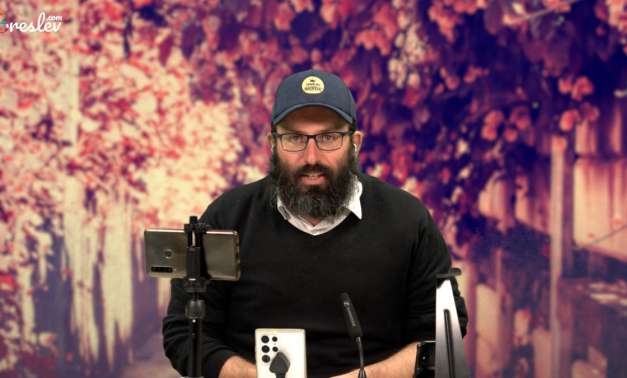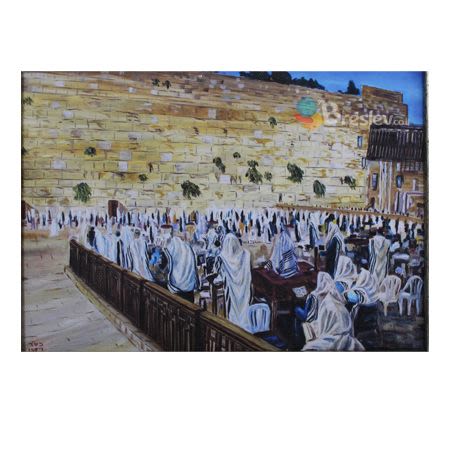
The Invitation
As opposed to the body which degenerates and moves downward over the years, the soul of an emuna-striving individual develops and steadily moves upward…

Richard regarded his freshly printed gold-embossed Bar Mitzva invitation with pride. In four more weeks, he'd be thirteen. He was now on center stage, the focal point of everyone's attention. His name appeared at the top of the invitation, printed in letters four times larger than any of the other details.
Nine years later, Richard lovingly inspected a different invitation. But this time, his name appeared in large letters on the left side, while the name of his bride-to-be appeared on the right side of the invitation. The letters of the bride and groom's names were a little less than twice the size of the other details.
Fourteen years later, Richard and his wife sat in the kitchen sealing envelopes of invitations to their son's Bar Mitzva. This time, their names appeared at the bottom, the same size as all the other details.
Twenty-five years later, as grandparents, their names appeared in tiny letters at the very bottom of the  invitation to their grandson's Bar Mitzva. This time, the letters were half the size of all the other letters to accommodate for the names of the Bar-Mitzva boy's other grandparents.
invitation to their grandson's Bar Mitzva. This time, the letters were half the size of all the other letters to accommodate for the names of the Bar-Mitzva boy's other grandparents.
Richard, already 61 and much wiser over the years, examined the invitation to his grandson's Bar Mitzva. He sighed. Compared to the invitations of his previous simchas, his name got steadily smaller and moved steadily downward. “What's the hope of this world?”, he scoffed rhetorically. “The next move downward is not on the invitation at all, but under six feet of dirt!”
* * *
Richard, after six decades on this earth, has finally arrived at the same conclusion that our sages teach in Pirkei Avot (Ethics of the Fathers): “Akavya ben Mahalalel say, reflect upon three things and you will not transgress: know where you came from, and where you're going, and before Whom you are destined to give an accounting.” Akavya then teaches us humility by telling us explicitly that we all came from a putrid drop and are headed for the realm of dust, maggots and worms. So according to Akavya, Richard is right: a man is headed steadily downward, for each day is closer to the grave, just as his name moves steadily from the top to the bottom of the invitation over the years.
How bleak and depressing! Is that all we have to look forward to? From time to time, we celebrate and have good times – eating, drinking, and merriment – but we all end up as fodder for the worms? That's the outcome of our expensive coiffures, cosmetic plastic surgery, and long hours in the gym?
If a person's life is bodily and materially oriented, then his future is certainly bleak and depressing. The body begins a steady process of degeneration from age 35 on. No wonder people are depressed; those who live until 85, spend fifty years watching their bodies steadily betray them. Growing old, from a bodily standpoint, is not at all an encouraging scenario.
Physical gravity pulls downward. Rebbe Nchman of Breslev explains that people are therefore naturally prone to sadness and depression.
Here's the good news: emuna is above nature. Spiritual gravity pulls upward. Therefore, in order to escape the hopeless fate of death, dust, and dinner for the worms, a person should adopt a spiritual orientation in life, emphasizing the soul rather than the body. With this thought in mind, let's go back and relearn Akavya ben Mahalalel:
Know where you came from, and where you're going –the real you is the soul, which according to the Zohar is a tiny part of Hashem. This is encouraging, for just as Hashem is eternal, so are our souls; they never die. We came from the loftiest place in the spiritual worlds, known as the Heavenly Throne. Our souls are sent down to this lowly material world to perform a specific mission – mainly, to learn emuna. After our brief 120-year tour of duty down here, we'll be returning to the upper worlds, where we'll be reporting to our Creator – detail by detail – about everything we did during our stint down here.
The spiritual-orientation scenario sounds a whole lot better that the body/material-orientation scenario where all we have to look forward to is the grave and the worms.
As opposed to the body which degenerates and moves downward over the years, the soul of an emuna-striving individual develops and steadily moves upward over the years. Like fine wine, such a soul – and the mind that houses it – steadily improve with age. No wonder that so many of our leading spiritual leaders are in their late nineties or even past a hundred, yet they have crystal clear minds.
With a spiritual-orientation, life steadily improves.
Each of us has free choice in deciding which direction we want our lives to take, up or down.
By the way, be careful not to write passages from Torah on your wedding and Bar Mitzva invitations, because they all end up in the trashcan.










7/16/2012
missed one invitation What about the invitation to come to this world that was beaming in light, describing the Jewish soul's Holy mission in this world? That soul happily came here to learn about HaShem, to help their family klal Yisroel and see the Ultimate Redemption come to be. And what about the part how when that soul entered this world HaShem was (and is) beaming with joy in each soul's effort to reach the goal. You can't take the Jew out of the tzaddik, and you can't take the tzaddik out of the Jew.
7/16/2012
What about the invitation to come to this world that was beaming in light, describing the Jewish soul's Holy mission in this world? That soul happily came here to learn about HaShem, to help their family klal Yisroel and see the Ultimate Redemption come to be. And what about the part how when that soul entered this world HaShem was (and is) beaming with joy in each soul's effort to reach the goal. You can't take the Jew out of the tzaddik, and you can't take the tzaddik out of the Jew.